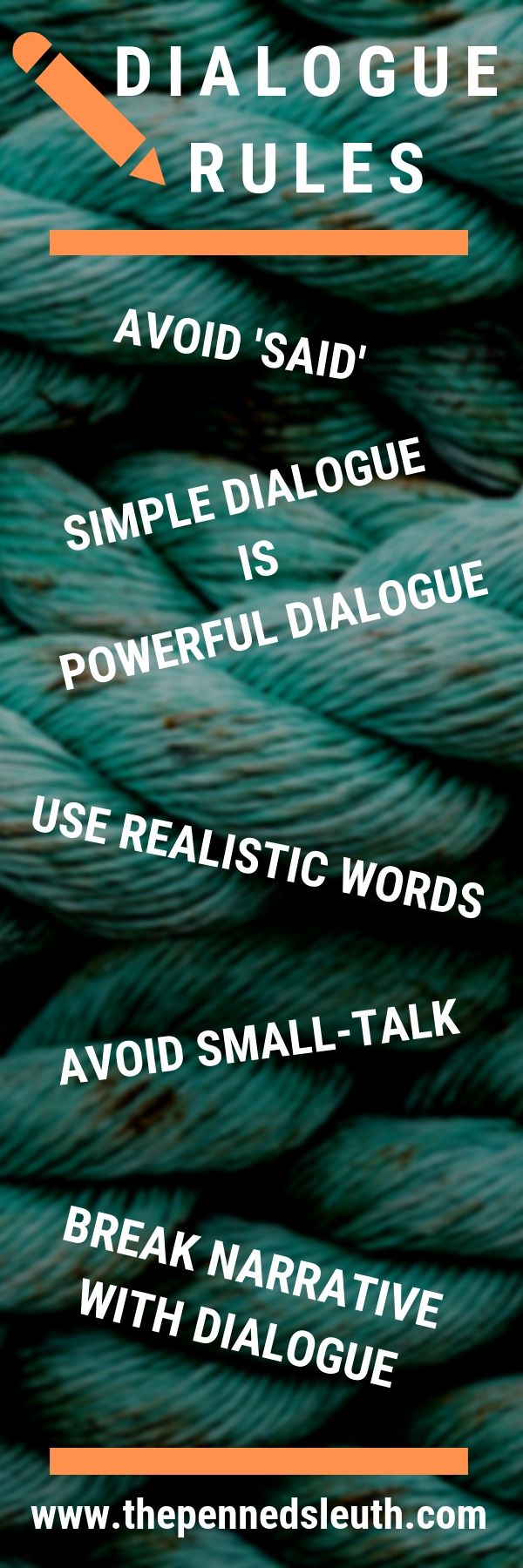Latest Writing Video! |
|
Dialogue is a wonderful essential for any book with speaking characters. Yet, it is easy to write mediocre dialogue. Here are 15 rules that ensure your next dialogue serves its purpose and has an impact on the reader. Let's break the ice! 1. Make Use of Proper GrammarWriters have their own formats for writing dialogue. Depending on education and origin, there are many formats that work in writing. With that in mind, you can improve your dialogue by establishing a clean a simple format. For example, my dialogue format helps cut out unnecessary tags. "If you mean it, then show it," she muttered in my direction. "I do mean it and I show it everyday!" "Well, it doesn't feel like it..." This is a simple format that allows the reader to know exactly who is speaking. To top it off, it cuts out anything that isn't necessary. Proper grammar goes a long way and once you find your format, stick to it. Nothing will jeopardise the flow of dialogue more if you confuse your reader down the line. On a personal note: I recommend experimentation with different dialogue. You might find one better suited for you than any other. You may even find certain formats suited for different genres. 2. Avoid 'Said'While 'said' is not the worst word in the world to use, there are better alternatives. Conveying emotion isn't easy, but one way that helps do so is using different verbs. It has often debated whether 'said' should be the chief word used in dialogue. Yet, I am the one writing this article and with a measure of poetic license, I say it shouldn't. A few examples of words you can use instead of 'said': I yelled, bleated, barked, roared, screamed, murmured, whispered, muttered, pleaded, begged, cried, lied, snapped, jabbered, gibbered, mumbled, grunted, snorted, cackled, rumbled, spat, screeched etc. We have all these words and more at our disposal, so we should make proper use of them. If you feel like expressing character emotions better, experiment. 3. Simple Dialogue is Powerful DialogueExposition is one of the worst forms of storytelling. The only time it is ever used is if the character speaks that way or it is more realistic. Otherwise, dialogue is best kept simple for the characters and the reader. Simple dialogue is often the most powerful as well. You cannot spend your time writing complex sentences if they fall flat. Take this for example: "I...I love you," he told her. "More than anything, I do." As opposed to this: "My feelings for you are greater than that of general affection," he told her. "These feelings for you amount more than the feelings I have for anything else, of that I am sure." While you can argue the second example is more poetic, it isn't as powerful. These interactions are more powerful with history backing them as well. Yet, simple speech is not only easier to read, but easier to relate to as well. In this case, less is more. 4. Make Use of Unique SpeechCharacters will have different backgrounds and education. With that in mind, most characters will have different phrasings. For example, you write their speech on their pronunciation. "Ya sure of dat?" Billy asked. "I'm shuper shure," Steven replied. "Sho shure that theysh bad." Of course, unique speech can be more in-depth than the way the characters pronounce words. Colloquialisms are another matter to consider. Phrases traced back to their origin country or societal group. Jargon and slang included. "You are a pain in the neck," Robert droned. "Well, yer a pain in me ***," Carl replied. Unique speech, as you can see, also helps describe a character's personality. It is for this reason you can see why many professional writers take their time here. Developing a personality for a characters requires a lot of thought and time. Yet, it will make for an interesting character from beginning to end. 5. Check the Purpose of the DialogueIt is easy to write dialogue that is meaningless. When I say meaningless, I mean something worse than small talk. Dialogue builds a characters or progresses a story. If dialogue fails to do either, it is on thin ice. There are many reasons to include such dialogue, such as comedy. Yet, if you find yourself lacking any smaller reason as well, that dialogue is best omitted. It is better to keep things simple, that way the reader stays invested. With that said, you break the immersion with dialogue not fitting the story or characters. "I saw a cloud the other day," William said. "I saw a cloud too," his brother replied. William nodded. I tried to make this example lack comedy, but that is difficult without context. Yet, I am sure you get the idea. Be sure to check your dialogue for its purpose in the novel. 6. Use Realistic DialogueToo often a writer will type out a cliche or some other unrealistic dialogue. It is so easy that it might take the writer a while to realise what they have done. Writers often do this to avoid swearing in their novel, but it is often necessary. The monster bit off the sailor's right hand in a gory display. "Goodness me!" the sailor yelled. "That hurts an awful lot!" As you can see, that doesn't read better than this: The monster bit off the sailor's right hand in a gory display. "****!" the sailor yelled followed by terrible screams. Not the best writing, but once more, you get the idea. If your story includes some strong imagery, it will need some strong language. It makes a scene far more gritty and believable. The reader wants to be immersed, by not coddled like a child when something bad happens. 7. Put Thought Behind SpeechYou are not the only one in the story. When you create a character, you have to approach dialogue from their perspective. You have to ask yourself, what is their opinion of the character they are speaking to? What kind of mood are they in? What kind of person are they when pressure is place upon them? "You know you need my help," the outlaw told the knight. "You best realise that before we are both killed. "You killed too many people for me to care about your life," the knight replied. "Yet...my king is in danger. If receiving the help of a demon ensures his safety, so be it." "Watch where you swing that sword and I will watch where I swing mine." The dialogue gives us enough information on the situation. We know the relationship between the characters, their opinions of each other. Yet, we also know they wish to live for a different purpose. For the outlaw, it is so he can live. For the knight, it is so his king may live. Despite the cooperation, these two still have ill feelings towards each other. Simple thought behind dialogue and it conveys the characters intentions to the reader. 8. Avoid RepetitionThere is a small list of don'ts that I will mention. The first is to avoid repetition. Some characters may argue, but it will only bore the reader if there is no progress. In these cases it is best to show some change or introduce new conflict. The same would apply to any form of repetition. Characters repeating lines is nonsensical if they lack purpose. Ensure that you limit these lines as much as possible. "You can do this, sir," the private told the captain. "You are the best there is!" "I will see it done, soldier." "That's right, you will. You are the best, sir, and that is why you can do this!" A big NO to this in any shape or form. 9. Avoid Small-TalkSmall-talk is much like speech without purpose. Yet, small-talk is on more common subjects. These conversations not only serve no purpose, they bore the reader as well. Dialogue centred on the story is what will keep the reader's attention, not thoughts on the weather. "I was hoping for rain today," Lionel grunted. "Yes, but I heard there will be some tomorrow," Ruby replied hopefully. Unless this is code exchanged between two secret agents, give it a miss and anything else like it. 10. Avoid Using NamesAnother simple rule, avoid using names in dialogue. While it is fine to tag the person speaking, names are often not mentioned in dialogue. That is not to say they never will be. In some cases, mentioning the name of the characters serves a purpose. "Robert Steven Musgrave!" Robert's mother yelled. "You get in here this instant!" "Coming, mom!" Robert nervously called back. Yet, most of the time it won't make any sense. "Good morning, Robert Steven Musgrave," Robert's mother greeted. "Good morning Barbara Alison Musgrave," Robert replied. It would be far better to say 'good morning', making it a more believable dialogue. Otherwise, it sounds like breakfast talk between two aliens. 11. Consider Character ReactionsCertain dialogue should receive certain reactions. It is often that writers who are starting out don't know how to keep a conversation flowing. Sometimes information will surprise someone or offend them. It helps improve dialogue if you include at least one or two reactionary dialogues. "...and of course I said, 'Yellow'," she continued. "What! I can't believe you said that!" It always pays to have fun with such reactions as well. In a dialogue between antagonist and protagonist, reactions make the dialogue more impactful. Something to remember if you his a dead-end in such a scene. 12. Action While SpeakingMore often than not, your characters are doing something while speaking. Including an action helps give a sense of pacing and even tension. Of course, this can be any action you wish. Something related to the character, the dialogue or the story helps too. "I'm almost out of nails!" I yelled over the hammering. "Take some of mine!" Sarah replied, position the board over the window. "And hurry up! The zombies will get in if you take so long!" It helps position characters, it makes them feel more alive. Having them react to the physical and audible world immerses the reader more. All these benefits for a little extra effort. It needn't be so dramatic, you characters could be making breakfast. Yet, having that action will add to the dialogue. 13. Emotions Cloud DialogueIf your characters are arguing, they will speak with anger. If they are sad, they will speak with misery. You can experiment with how each acts feeling the same emotion, but emotions play a huge part in dialogue. It might slow it down, it might speed it up. Yet, by keeping the emotions of the characters in mind, you improve the dialogue. "I-I don't know if we should do this," Louis murmured, his fingers tapping. "What if we get caught?" "Then we get caught," Craig shrugged, placing a hand on Louis's. "But we need to try, Louis and you know I need your help." "I-I...ugh...fine." You can almost catch the anxiety from the character. You breathe out with his grunt. These emotions are easy to capture if you keep them in mind. A dash of empathy or relating the way you speak feeling such an emotion helps too. In the end, the dialogue is more impactful. 14. Read Dialogue AloudA more common rule, but it will help if you find yourself stuck. Some dialogue isn't easy to write. The kind of dialogue you have no experience with, for example. That is why it is better to read it aloud. Doing so will help place you in the situation and you can better think of the right response. Reading the dialogue aloud is the most useful tool for combating these difficulties. 15. Break Narrative with DialogueFinally, the last piece of advice you need to hear. Narrative can be long-winded and boring. Yet, there is almost always an opportunity to break it up with dialogue. The last rule on this list is not applying to how to write dialogue, but when to write a dialogue. If you find the narrative to slow and need to speed things alone, use dialogue. It is a tool used in the real world, it is a tool used in your novel. Don't be afraid to introduce some dialogue and take the story a step forward in the right direction. I hope this article helped you in improving your dialogue, that you learnt a thing or two. If you enjoyed, be sure to follow and I hope to hear how well your writing is going in the comments! Thank You!Dear Writer, Thank you for finishing this article. I had a lot of fun writing it and I hope you truly enjoyed it. There are many things you will learn from the writing experience and the 150 above are only a few. As a big thank you I would like to offer you something for FREE! A writing course on how to improve your main character! Click here to check it out your course. In addition, if would like to receive more content, bonuses and some big discounts on future courses, join the writers group here. Thank you very much for reading! Kind regards Matthew Dewey, Writer Pin for Later!
1 Comment
|








